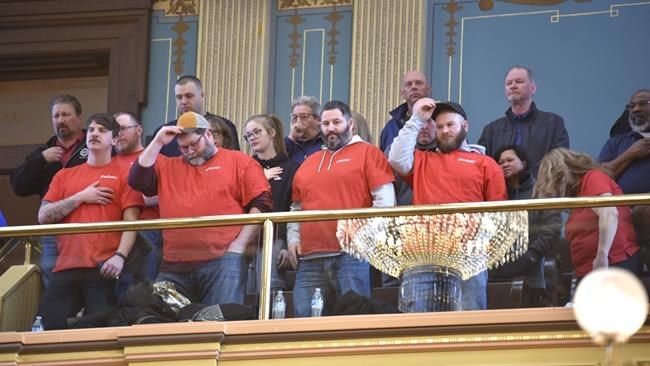LANSING, Mich. (AP) — Michigan, long known as a mainstay of organized labor, on Friday became the first state in decades to repeal a union-restricting law known as “right-to-work” that was by a Republican-controlled Legislature.
The state's “right-to-work” law had allowed those in unionized workplaces to opt out of paying union dues and fees. Its repeal is seen as a major victory for organized labor with union membership reaching an all-time low last year.
"Today, we are coming together to restore workers’ rights, protect Michiganders on the job, and grow Michigan’s middle class,” Democratic Gov. Gretchen Whitmer said in a statement Friday after signing the legislation.
The second-term governor also signed legislation restoring a prevailing wage law that had been repealed by Republicans in 2018. It requires contractors hired for state projects to pay union-level wages.
Repealing the “right-to-work” law, enacted in 2012, had long been , who took control of the full state government this year for the first time in 40 years.
Supporters of the repeal poured into the state Capitol in Lansing earlier this month as before approving it along party lines after limited deliberations.
“It’s a new day here in Lansing,” Senate Majority Leader Winnie Brinks said prior to the vote. ”It’s time to once again make Michigan known as a place where workers want to come."
Democrats had argued that the law allowed for “free riders” that received union representation without having to pay fees or dues. Without it, unions can now require all workers in a unionized workplace to pay fees for the cost of representation in bargaining.
Michigan had the nation’s seventh-highest percentage of unionized workers when the “right-to-work” law was enacted in 2012, but that dropped to 11th in 2022. Over the past decade, union membership in Michigan has fallen by 2.6 percentage points as overall U.S. union membership has been falling steadily for decades, reaching an all-time low last year of 10.1%.
Michigan becomes the first state in 58 years to repeal a “right-to-work” law, with Indiana repealing its in 1965 before Republicans there restored it in 2012. In 2017, Missouri's Republican Legislature approved a “right-to-work” law, but it was blocked from going into effect before voter's overwhelmingly rejected it the next year.
In total, 26 states now have “right-to-work” laws in place. There were massive protests in Indiana and Wisconsin in recent years after those legislatures voted to curb union rights.
In Michigan, thousands of union supporters descended on Michigan’s Capitol to protest in 2012 when the Republican controlled Statehouse pushed the “right-to-work” legislation through without hearings.
Neighbored by state's with “right-to-work” laws, Republicans say the repeal will lead to Michigan becoming less attractive to businesses and will lead to forced union membership.
“These wide swings in public policy, this whiplash effect that we’re possibly seeing here in Michigan isn’t helpful for a stable economic climate or for growing jobs in Michigan,” Wendy Block of the Michigan Chamber of Commerce
The legislation Whitmer signed also includes $1 million in appropriations, which Republicans say is to ensure they are “referendum-proof.” The Michigan Constitution states that bills with appropriations attached to them are not subject to a public referendum in which voters could reject the law.
Whitmer promised in her 2019 State of the State speech to “veto bills designed to cut out the public’s right of referendum.”
The Democratic governor on Friday also signed legislation repealing a third-grade reading law that required students to repeat the grade if they test more than one grade level behind in reading and writing.
Joey Cappelletti, The Associated Press




